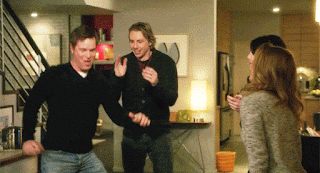ANOTHER PERIOD is a new Comedy Central show from the minds of two lady comics who have been floating around the industry for the last tweny years: Riki Lindhome and Nastasha Leggero. ANOTHER PERIOD builds on themes they’ve been developing in their other work, so let’s run through their resumes quickly.
Riki Lindhome
is one half of singing comedy duo Garfunkel and Oats, along with Kate Micucci.
G&O had their own short-lived 8 episode show on IFC. One of the best storylines
was when Riki’s character took hormones to preserve her fertility because she
wasn’t ready to have a baby yet. The real Riki did this in real life, and was
shocked that no one had ever talked about it. So she put it on television, and
it’s some of the funniest, most relatable comedy I’ve ever seen. I’m a tiny bit worried by
how much I understand her hormonal emotional-rollercoaster
self. Aside from G&O,
Riki has been a working actress and comic for years; she played Logan’s friend
on Gilmore Girls. She’s that legit.
Natasha Leggero is a standup,
and longtime friend and collaborator of Chelsea Handler, a frequent guest on the
round table portion of Chelsea Lately. I have not seen nearly enough of that
show, so I can’t comment on her performance there. But I’ve seen Natasha pop up
in cameos for years—including on Garfunkel and Oats. She usually plays some
version of a sex kitten, lampooning a role she obviously feels forced into by
leaning all the way in. I’ve always been entertained by her, but never knew if
her shtick landed for me or turned me off.
And now we have
ANOTHER PERIOD, the clearest articulation of themes these women have been
exploring for years. The show is about the Bellacourt family, members of a
cadre of 1%ers who built extravagant mansions in Newport, Rhode Island in the
early 1900s before the Great Depression ruined everything. Beatrice and Lillian
(played by Riki and Natasha) are the Bellacourt sisters, the main characters.
The ensemble includes their siblings: Freddy, who is also Beatrice’s lover, and
Hortense, a feminist; their mother Dodo, who is addicted to morphine and
accidentally urinates on important guests; Peepers the butler, who is committed
to his second-class status and in love with Dodo; Garfield the under-butler;
Blaire, one of the serving women; and another serving-woman Chair, formerly
known as Celine, and played by Christina Hendricks in a role almost exactly modeled on her
time as Saffron in Firefly. Sometimes the Bellacourt dad shows up to have an
affair with Chair and be an ass. There are also great cameos in nearly every
episode, including Ben Stiller (an executive producer).
A big source of
story and comedy is the division between the upstairs and downstairs. The
servants are treated like animals or objects. Lillian literally renames Celine
Chair when they first meet, and the name sticks. Peepers is devoted to this
class system, and enforces it much more harshly than any of the upstairs
people, even when he’s impersonating Commodore Bellacourt at a dinner party
Dodo brings him to. Having grown up visiting the Newport Mansions and learning
all about the “wonders” of that time, I love that the show is constantly highlighting
this class division for what it really is: imaginary and awful.
Class isn’t the
only thing the show demolishes. This is probably the most feminist thing on
television right now. They do things that I’m shocked the FCC let through. In
one of the episodes Beatrice and Lillian are getting ready for a party, and
they hold up their skirts to reveal enormous bushes so Blaire can spritz them
with perfume. In another episode, the ladies are treated for hysteria. This
involves Blair tickling Beatrice with a feather to climax, which takes half a
second, and Garfield operating a dildo attached to a spin bike on Dodo, who
apparently needs a bit more work to get
there. In another story line, Lillian pays one of the servants to kidnap
her so she’ll be a story in the papers. Events take a nasty turn when it seems
like he might make her a sex slave. But the tone shifts again when she’s
totally into it. And then he can’t really get it up, and the whole thing is
revealed to be an elaborate sexual role-playing fantasy.
I feel like I’m
always writing about feminist stuff like that’s the point, but it’s not. The
point is that I write about GOOD stuff, and content is just better when it includes
a diversity of experiences and voices. Diversity means different kinds of
people rubbing up against each other, friction that is guaranteed to create
conflict. And like smoke, where there’s conflict, there’s story. And I’m not
saying men can’t play in comedy anymore—Louis
is totally feminist, and really funny. Comedy like ANOTHER PERIOD is
refreshing and exciting and also really extremely funny. There are so many things we’re not allowed to talk about
(like pubic hair, which pop culture would lead us to believe has never existed).
Shining a spotlight on unspeakables is funny. We like to think that our country
has advanced in the last hundred years to be freer, less racist, less classist,
less misogynist. But some of the plot lines here, though satirical, are a
little too familiar for that to be totally true. ANOTHER PERIOD looks to
history to comment on the present.
And did I mention it’s funny?
And did I mention it’s funny?





























